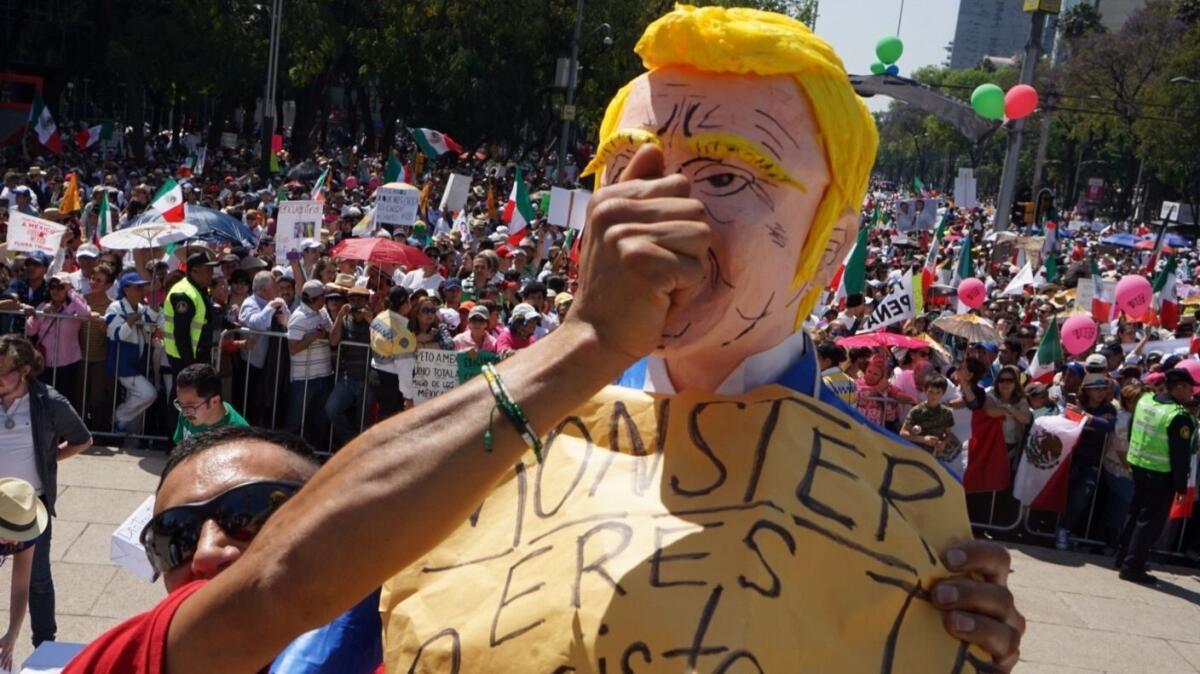Will the U.S. punish Mexico on trade? A Trump supporter has doubts

Al Zapanta, a Purple Heart and Silver Star-awarded Vietnam War veteran who is rumored to be in consideration for U.S. ambassador to Mexico, thinks that he can change President Trump’s mind on the value of doing business with our southern neighbor.
In his first month in office, Trump has sent clear signals that he means to revolutionize the U.S. relationship to Mexico.
An early Trump executive order called for the construction of a wall on the Mexican border. White House Press Secretary Sean Spicer suggested that the U.S would levy a 20% tax on imports at the border to cover the cost, which the Department of Homeland Security estimates at $21.6 billion, though he later said that proposal was one of many on the table.
The president also formally announced that he would begin the process of renegotiating the North American Free Trade Agreement. Soon after, the Mexican government said it had started a 90-day period of consultation with business groups on how to approach those talks.
At a recent conference of major automakers in Mexico City, the mood was tense, but Zapanta was not. The Los Angeles native worked for the last five Republican presidents and now heads the U.S.-Mexico Chamber of Commerce, where he facilitates cross-border business.
Zapanta says he has been frank about the positive impact of trade with Mexico on the U.S. economy. The Times asked him why he is relatively upbeat about Trump’s approach to Mexico.
Can you explain why you think the 20% tax is untenable?
Because it has a boomerang effect. Let’s say you do it. Are you going to do it every time a product comes across from Mexico, and yet it’s going back five, six, seven times? That’s over 100%, you’re not going to do that. That’s number one. Number two, Mexico’s not going to stand for it because it will impact their economy. So they can do a countervailing tax. And who really suffers? The consumer, and where are they? Mainly in the U.S.
When you think of other ways about dealing with the U.S. trade deficit, what are more likely options?
If [Trump] does the kind of tax reform that helps bring back all that money that’s sitting offshore, [cutting the] 39% personal tax and 35% corporate tax [rates], the money will flow back. Why? It’s safer here.
When you look at NAFTA, it is the most successful trade regime in the globe.
How do you define that?
When you see how much trade has gone between Canada, the U.S. and Mexico since its inception — it has grown to $1 trillion.
Right, but for some in the Trump administration, including [top trade advisor] Peter Navarro, that is not necessarily a measure of success.
Well, why don’t you ask them if innovation and technology has any impact on how we lost those jobs. They don’t have an answer.
You seem to have some insight into how Trump thinks about this issue.
In the meetings that I have had with Trump, I will tell you that when he started to talk about [NAFTA] I said, well let me give you another perspective. He all of a sudden just stopped and looked and listened. I am comfortable to say that he is a very quick study. He makes decisions quickly, which rattles some people.
What about Navarro’s strong views on trade?
If I become the ambassador down here — which they are saying I am, but I don’t know for a fact and am not seeking it — he and I will cross swords.
You don’t think Navarro will win out in the Trump administration?
[Shakes his head no.] There are too many moving forces. When you have a guy like [Secretary of State] Rex Tillerson, who comes out of industry, he’s not going to roll over that easy. A guy like Navarro doesn’t match that. But if you put Navarro and Wilbur Ross [Trump’s nominee for secretary of Commerce] together, that’s a different combination. We have to wait and see.
What’s the mood in Mexico? Is there a freaking-out moment?
I don’t know if it’s freaking out. The Mexican people, those that stay up with all the publicity that’s going on and hear some of the rhetoric, of course they take it personally and should, because there were some things with the campaign and the rhetoric that then-candidate Trump said that was, you know, you could take personally.
At the end of the day people are nervous because the economy isn’t doing well, the gasoline prices are up, now the subsidies are coming off. The peso is at 21 or 22 [to the dollar]. I mean, it’s a fragile time.
Follow me @NatalieKitro on Twitter
ALSO
Trump’s Mexico visit stirs outrage: ‘We don’t want him’
Trump administration clears the way for far more deportations
More to Read
Inside the business of entertainment
The Wide Shot brings you news, analysis and insights on everything from streaming wars to production — and what it all means for the future.
You may occasionally receive promotional content from the Los Angeles Times.











